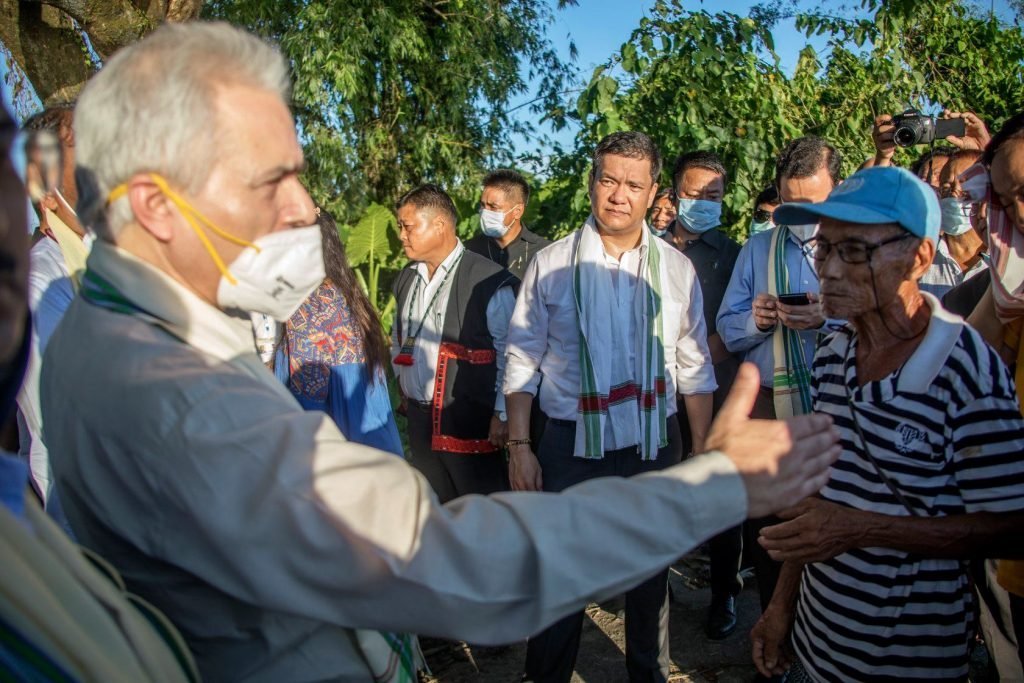LOWER SUBANSIRI DDMA
THIS PAGE CONTAINS INFORMATION RELATING TO DISTRICT PROFILE, ACTIVITIES, DDMP’s, DOS AND DONT,s & MORE
PLS ENTER THE DISTRICT PROFILE INTHIS TAB. AND THE OTHER DETAILS IN THE RESPECTIVE TABS
Dated: 1 Septemeber 2020 : Honble CM & Minister fro the Center Inspected flood damages caused by the ravaging Siang river in #EastSiang district of Mebo area in Namsing circle
EARTHQUAKE
1. Make your house earthquake resistant and secure heavy furniture and objects
2. Choose a couple of family meeting place; pick easy to identify, open and accessible places that you can easily reach. Prepare to be self-sufficient for a minimum of three days.
3. If inside, stay inside.”DROP, COVER, and HOLD! Drop under firm furniture. Cover as much of your head and upper body as you can. Hold onto the furniture. Move to an inside wall and sit with your back to the wall, bring your knees to your chest and cover your head. Stay away from mirror and window. Do not exit the building during the shaking.
4. If outdoors, move to an open area away from all structures, especially buildings, bridges, and overhead power lines.
5. objects and other hazards above and around you. Check yourself for injuries.
6. Anticipate aftershocks, especially if the shaking lasted longer than two minutes.
7. Stay out of damaged buildings. Listen to the radio or watch local TV for emergency information and additional safety instructions.
The crack of quake. All our hopes shake,
FIRE
1. In case of fire, dial 101 (or the special number for FIRE SERVICE in your area/ town).
2. Learn at least two escape routes and ensure they are free from obstacles.
3. Remain calm, unplug all electrical appliances.
4. Keep a bucket of water and blankets ready.
5. If clothes catch fire, Stop, Drop, and Roll.
6. In case of an uncontrolled fire, wrap the victim in a blanket, till the fire ceases/stops.
7. Don’t burn crackers in crowded, congested places, narrow lanes, or inside the house.
8. Don’t cover crackers with tin containers or glass bottles for extra sound effects.
9. Avoid wearing long loose clothes, as they are fast in catching fire,
10. Don’t remove burnt clothing (unless it comes off easily).
11. Don’t apply adhesive dressing on the burnt area.
12. Don’t throw lighted cigarette butts.
Nature is full of bounty and beauty.Protect it and fulfill your duty,
LANDSLIDE
Avoid building houses near steep slopes, close to mountain edges, near drainage ways or along natural erosion valleys.
2. Avoid building houses near steep slopes, close to mountain edges, near drainage ways or along natural erosion valleys. Avoid going to places affected by debris flow. In mud flow areas, build channels to direct the flow around buildings.
3. Stay alert and awake. Many deaths from landslides occur while people are sleeping.
Listen for unusual sounds that might .indicate moving debris, such as trees cracking or boulders knocking together.
4. Move away from the landslide path Ör debris flow as quickly as possible.
5. Avoid river valleys and low-lying areas. If you are near a stream or channel, be alert for any sudden increase or decrease in water flow and notice whether the water changes from clear to muddy.
6. Go to designated public shelter if you have been told to evacuate.
7. Stay away from the slide area as there may be danger of additional slides.
8. Check for injured and trapped persons near the slide, without entering the direct slide area.
Keep environment intact, Mitigate disaster impact.
FLOOD
All your family members should know the safe routes to the nearest shelter/raised pucca house.
2. If your area is flood-prone, consider suitable flood-resistant building materials.
3. Tune to your local radio/TV for warnings and advice. Have an emergency kit ready.
4. Keep dry food, drinking water and clothes ready. Drink preferably boiled water.
5. Keep your food covered, don’t take heavy meals.
6. Do not let children and pregnant women remain empty stomach.
7. Be careful of snakes, as snake bites are common during floods.
8.Pack warm clothing, essential medication, valuables, personal papers, etc. in waterproof bags, to be taken with your emergency kit.
9. Raise furniture, clothing, and valuable onto beds, tables, and in the attic.
10. Turn off the main electricity power supply. Do not use electrical appliances, which have been in floodwater.
11. DO not get into the water of unknown depth and current. Do not allow children to play in, or near floodwater.
Become friendly with nature, Disaster will most likely not occur in future
PANDEMIC & EPIDEMICS
1.Store at least two week supply of water and food.
2. Do not go out until its absolutely necessary
3. Periodically check availability of your regular prescription medicines
4. Have non-prescription medicines and other health supplies in hand, including pain relievers, stomach remedies, cough and cold medicines, fluids with electrolytes, and vitamins.
5. Volunteer with local groups to prepare and assist during emergency response.
6. Keep your surroundings clean and do not let the water be stagnant.
7. Avoid close contact with people who are sick. When sick, keep distance from others to protect them from getting sick.
8. If possible, stay at home; keep away from work, school etc. when you are sick. This will help prevent others from getting infected.
9. Cover your mouth and nose with a tissue while coughing or sneezing. Washing your hands often will help protect you from harmful germs.
10. Avoid touching your eyes, nose or mouth. Germs are often spread when a person touches something that is contaminated with germs and then touches his or her eyes, nose, or mouth.
When you choose to safeguard nature, You choose to secure your own future
THUNDER & LIGHTENING
1. Keep ready an Emergency Kit with important medication. Postpone outdoor activities.
2. Remember, rubber-soled shoes and rubber tires provide NO protection from lightning.
3. Unplug any all electrical/ electronic equipment/ appliances such as bubs, computers, fans, etc. and turn off air conditioners well before the storm arrives.
4. Use your battery-operated Radio for news updates. Avoid contact with electrical equipments or cords.
5. Do not lie on concrete/ marble floors and do not lean against concrete walls.
6. Continue to listen to local radio and television stations for updated information or instructions, as access to roads or some parts of the locality may be blocked.
7. Help people who may require special assistance, such as infants, children, women and the elderly.
8. Stay away from broken power lines and report them immediately.Alert today. Alive Tomorrow
FOREST FIRE
1. Try to maintain FOREST BLOCKS to prevent day litter from forests during summer season.
2. Try to put the fire out by digging or circle around it by water, if not possible to call a Fire bridge.
3. Move farm animals & movable goods to safer places.
4. During fire listen regularly to radio for advance information & obey the instructions cum advice.
5. Teach the causes and harm of fire to your family and others. Make people aware about forest fire safety.
6. Do not be scared when a sudden fire occur in the forest, be calm & encourage others & community to overcome the problem patiently.
7. Do apply seasonal mitigation measures i.e., fuel reduction etc.
8. Don’t throw smoldering cigarette butts or bidi in the forests.
9. Don’t leave the burning wood sticks in or near the forest.
10. Don’t enter the forest during the fire.
11. Discourage community to use Slash & Burn method
Become friendly with nature, Disaster will not occur in future
District Disaster Management Plan
The plans will appear here..




